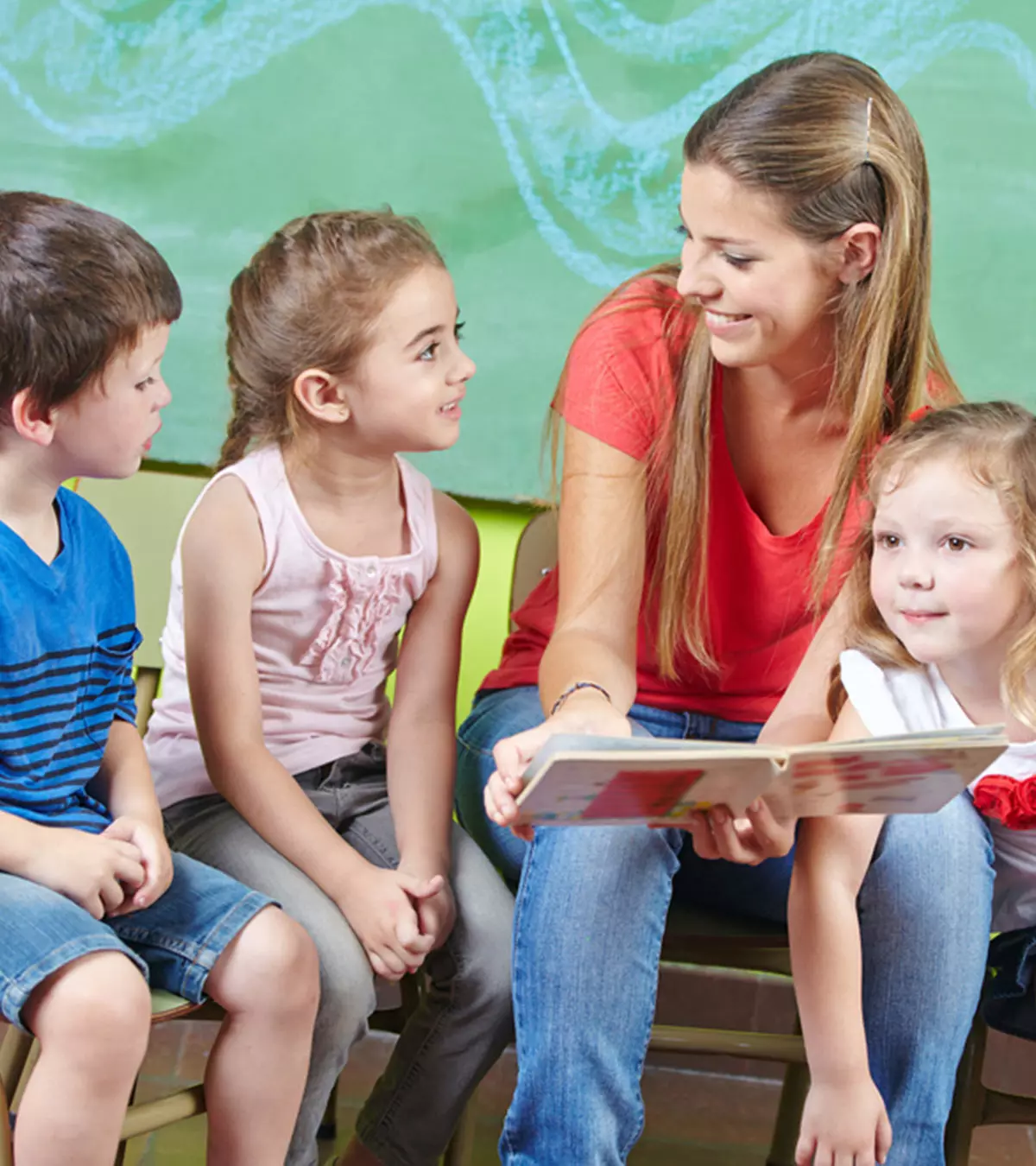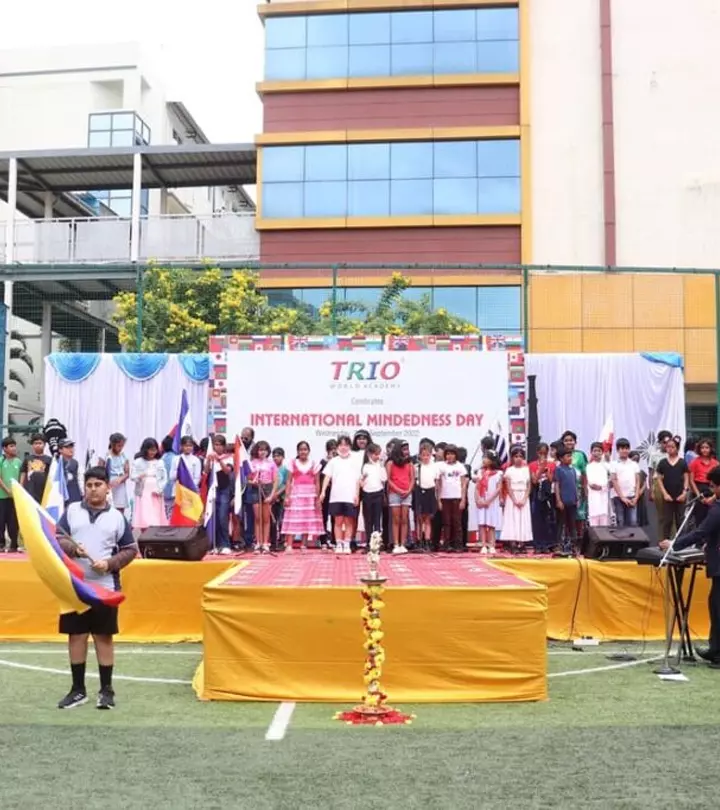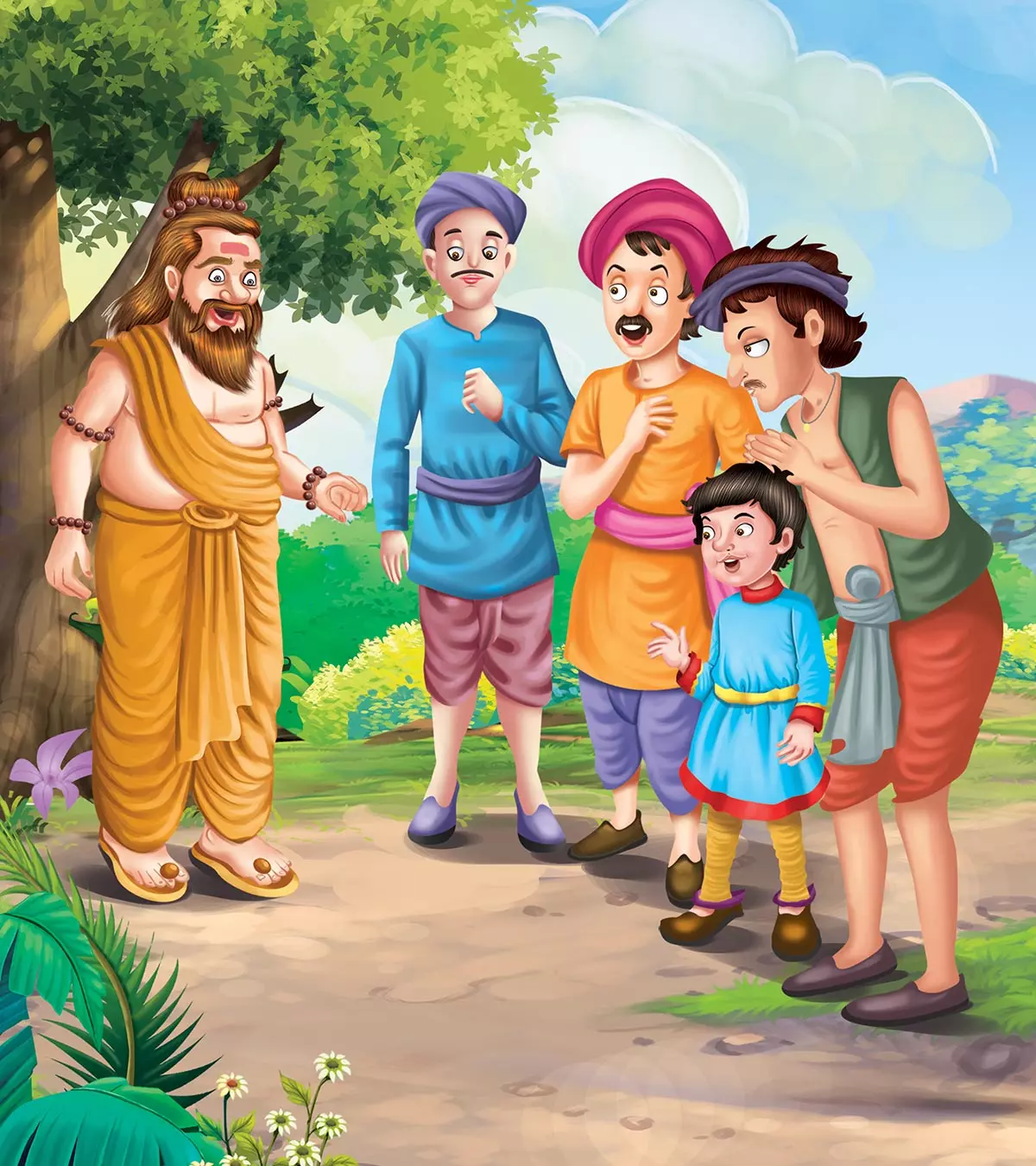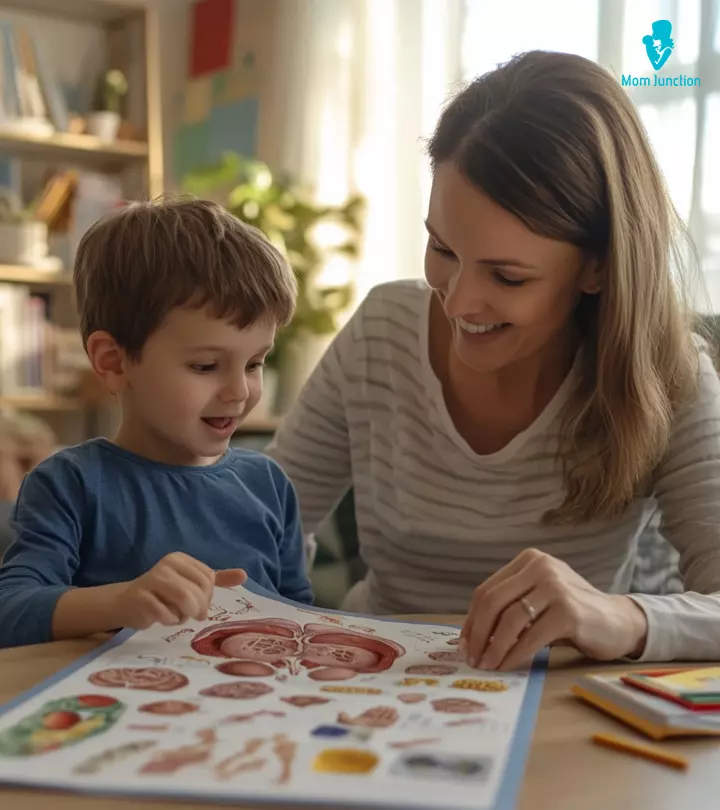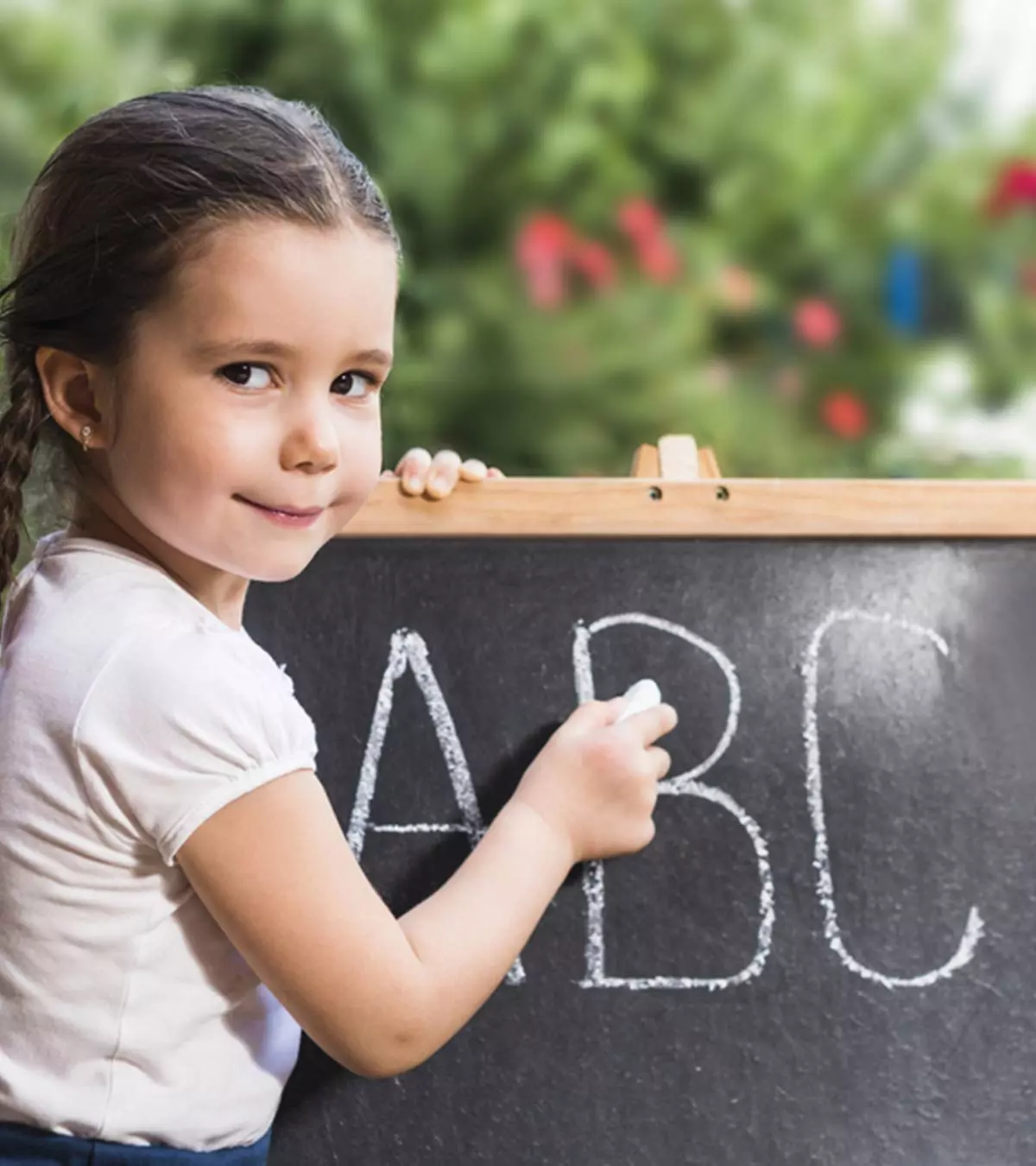
Image: ShutterStock
As kids, we have all had our share of games involving different role play, such as being a cook, a dog walker, a homemaker, or a baby. Here, we have listed some interesting role play ideas for kids that you can suggest if they have run out of ideas or are bored with the ones they have. Role-playing is all about creativity and imagination. It is also the best way to keep children engaged with different games. Pretend-playing kitchen, home, school, or any fantasy world allows them to imagine and develop scenarios by themselves. Read on to know about some more interesting role play topics that can add fun to their games.

Key Pointers
- Role play games can help children tap into their creative and imaginative side and improve their social and sensory skillsiAbilities related to basic human senses, such as seeing, hearing, smelling, touching, and tasting. .
- Role-playing as a teacher will help children broaden their knowledge and teach their siblings or friends.
- You can also get into roles with your child, share a bonding experience, and make memories.
Importance Of Role Play For Children
Role-playing for children is one of the best games to stimulate their creativity, expand their boundaries, and enhance their imagination.
Children create new worlds and scenes in their little heads and enact them. They learn about the world around them by watching, listening, tasting, and touching. When they are newborns, they know absolutely nothing and rely on their parents. However, as they grow, their senses develop, and they begin to form new impressions (1).
Encouraging your children to play roles will help in developing their sensory and social skills. They learn to make healthy choices and connections and solve real-life problems. Here are some reasons why role-playing is so important to children (2).
- Role-playing or impersonation allows children to experience scenes that they would not face regularly. They also begin to understand their likes and dislikes, interests, and abilities. They can participate in skits, dramas, mimes, and plays if it piques their interest. Sometimes, role-paying may go a long way in determining a child’s future career.
- Children act out what they have observed. They try to recreate their experience during the role play. This is what they do when they play with dolls. Children regard dolls as themselves and use dolls as models to express their experiences. Role-playing is a good way for children to express new ideas and feelings. They find it easier to express their ideas through games.
- Children learn from their surroundings. Role-playing helps children develop social and emotional intelligence. They can also read social cues, regulate emotions, make decisions, and engage in fruitful activities.
- Children learn complex skills like negotiation, bargaining, judgment, valuing opinions and ideas of others, making plans, and putting them to practice.
- Children learn better when in social situations. They need opportunities to socialize with their peers or willing adults to combine learning skills and acquire new knowledge.
- When children cannot go out, role-playing helps to meet their physical exercise requirements. During the formative years, children need to jump around on the pillow, climb, or run. Besides, role-playing helps develop gross and fine motor skillsiSet of abilities that help move and control various body parts, especially hands, legs, and fingers. .
 Quick fact
Quick fact31 Role Play Ideas For Kids
Role-playing is a fun and interesting way to involve your children and help them learn new skills. Here are some role-playing ideas for kids that you can use to make role-playing enjoyable.
1. Obstacle race

Use random furniture, empty delivery boxes, or other household items to make a great obstacle training ground at home. Stack them or arrange them strategically. Ask your child to complete the course. You can even set the time to make it more challenging. If more than one child is involved, each child can complete the obstacle course in turn. Make it a team activity, cheer and encourage everyone, rather than make it a competition.
The obstacle race provides lots of mental and physical stimulation for your child, and after an afternoon of vigorous activity, they will feel tired.
2. Chef

Becoming a chef is one of the easiest role-playing ideas for kids. You can find most of the items needed to play in the kitchen. Put on an apron for the child. You can create the chef’s hat from the newspaper.
Assign them a wok, oven mitts, spatulas, plates, spoons, and other utensils, and see if they can bring you novel foods. Be sure to compliment their efforts and the taste of their “food.”
Ensure child’s safety by not allowing them any sharp objects or playing near the stove in the kitchen.
3. Teacher

This role-playing game for kids is perfect for toddlers, young children, and preschoolers. Many times, younger children learn alphabets from older siblings. This game is an absolute classic that every child likes to play. Give your child some colored chalk and a blackboard. They will be happily teaching each other for hours.
If your child is an only child, then their toys can become their “students.” You can also use teaching as an excuse to let them practice spellings and numbers.
4. Hairstylist

Your child must have visited a hairstylist at least once. Ask them to use their skills to style your hair. Give them combs and aprons. When they work their magic on your hair, sit down and relax. Let us warn you that your child’s head massage can be soothing, and you may even drift!
If you have multiple children, you can ask one child to style the other child’s hair. Be sure to pay attention to the goings-on. Allow them to use mirrors so that they can admire their work. This game can also be played with dolls.
5. Doctor

This is one of the oldest and most popular role-playing games. Playing a doctor needs some basic settings. Children will need a doctor’s gown, a mock stethoscope, mock syringes, a mask, etc. Usually, you can get doctor play kits at toy stores and e-commerce sites. You can play as a patient while your child dons the role of a doctor. This is also a good way to reduce or remove fear associated with doctor’s visits or injections.
6. Zookeeper
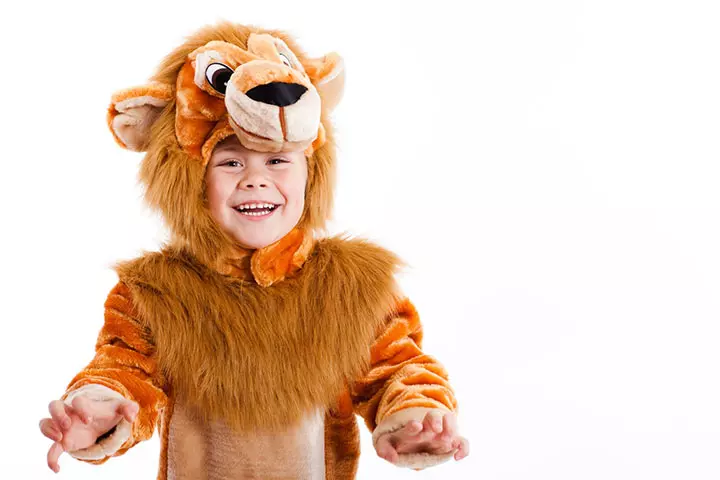
If your child has soft toys, you can use them for role play. Flip the basket on the soft toy and let the children take care of the animals. They must feed them and clean them regularly, and also ensure that they do not get sick. If the animals fall sick (pretend), the zookeepers must also take care of them.
 Point to consider
Point to consider7. Farmer

This is similar to the zookeeper game, but this time you let the animals do farming. As a farmer, your children are responsible for maintaining crops, including sowing and harvesting crops, and are responsible for taking care of the cattle. The animals can be used for cultivating the soil or for other purposes such as providing eggs, milk, and wool.
If you have a kitchen garden, this game is best. You can teach children the basic concepts of planting seeds and growing plants. They also learn the uses of various farm animals and understand the sources of various animal-based foods.
8. Camping

This is a game that most families must have played at some point. It involves the use of tents, so children like it very much. You can set up a tent in the garden or even on the balcony. You can be adventurous and even light a campfire and toast marshmallows. You can also include story-telling and music games for kids to enhance the fun.
9. Builder
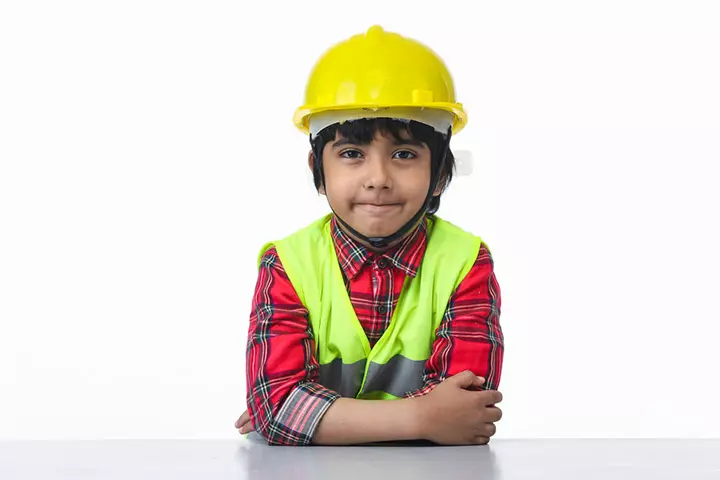
Ask your children to use their imagination and construct a building with objects they find around the house. If you have two or more children, ask one child to be an architect and plan the structure while the other can play the engineer’s role and decide the building materials, and then everyone can gather together to build. This game is interesting and can appeal to children of all ages.
10. Gardener
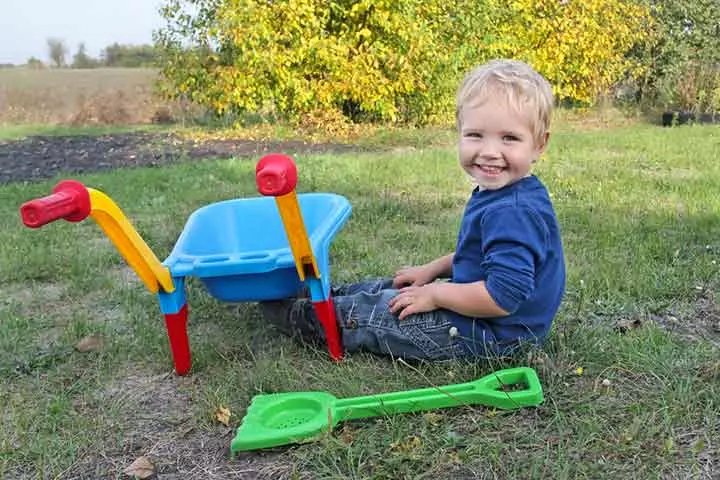
Your children can become a professional gardener with this role-playing idea for kids. If you have a garden or kitchen garden, you can actually show your children how to plant seeds and water them. You can teach them about fertilizers and pesticides, how to use household waste to make compost. When plants begin to grow, the happiness they bring is unlimited. However, if you don’t have any gardening space, don’t be discouraged. You can use Styrofoam sheets and press the stems of artificial flowers into them and create your own home garden. Ask your children to pretend to water them and take care of them like real flowers.
11. Pizza chef
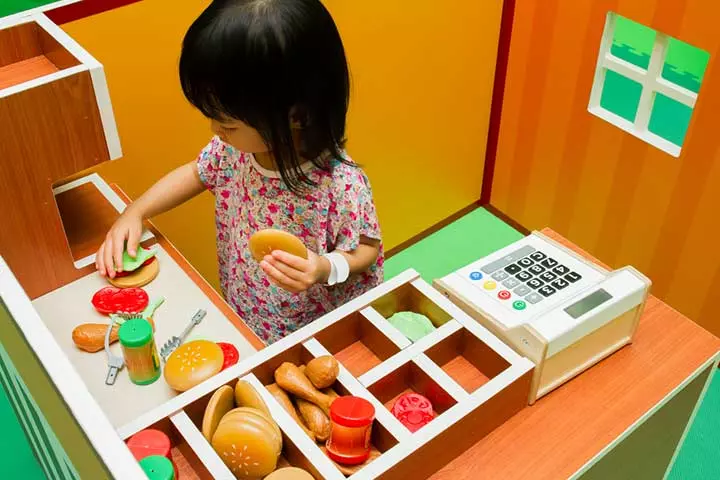
Allow your children to become pizza chefs by creating pizza pieces out of felt. Let them try different toppings and make different pizzas. They can even customize pizzas according to the order. You may need a pizza box, some cardboard, colored felt, and pizza props like ketchup and chili flakes. Cut a circle from cardboard and spread cream or beige felt on it. Cut out different ingredients from the colored felt, such as cheese, tomato, olives, onion, pepperoni, and jalapeno.
You can play the role of a customer, while the dress-up chef makes pizzas according to your choice. Besides entertainment, this role-playing game for kids also develops their fine motor skills.
12. Treasure hunter
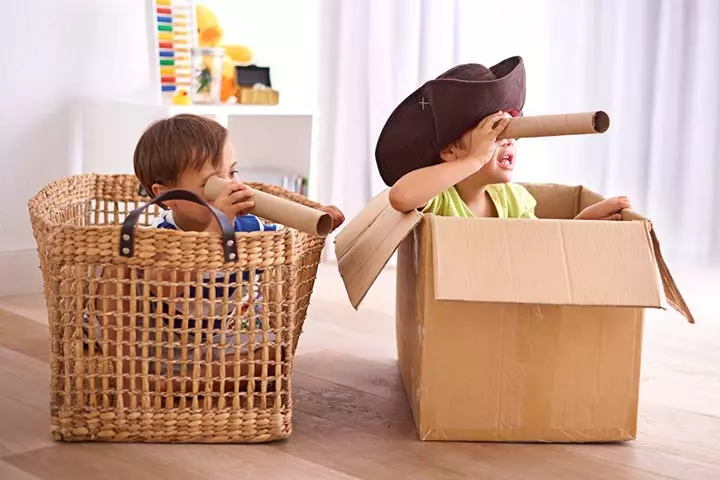
Let your children become detectives or pirates while searching for treasure. Combine this activity with a scavenger hunt to make it more interesting. Use maps or clues written on paper for tracking. When children discover new clues based on the old clues, they are one step closer to finding treasure. You can make hunting simple or complex according to the age of your child.
If you want to make it more challenging, you can set a deadline for each lead.
If you have more than one child, they can form a team and let them have a competition to find treasure. This role-playing game designed for children can teach teamwork and improve their problem-solving skills.
 Research finds
Research finds13. Veterinarian

Children like animals. They can play this game with their own stuffed animals.
Give them a plastic knife and some syringes. They will spend hours treating injured and sick animals. One child can be a veterinarian, and other children can be nurses. One child can play the role of an animal. Setting up a washing center can add more fun to this activity.
14. Librarian

Use children’s books to make them a small library. Let them become librarians. They must issue books and make a note in their register. You can play the book borrower’s role and ask the librarian to trace a book from the catalog.
This activity allows them to appreciate books and even develops their lateral thinking abilities. They can even learn how to interact with visitors.
15. Post office
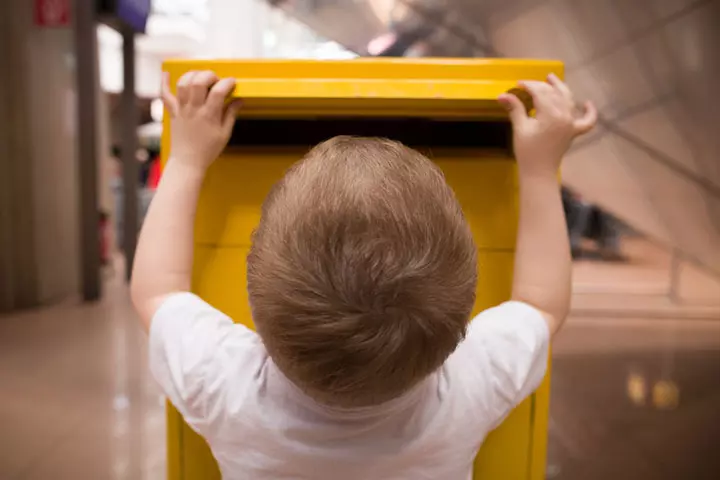
Collect some envelopes from your junk mail. Add some stamp stickers. Ask your children to create a mailbox from a small cardboard box. They can take turns as postmen. They can set up a counter to sell stamps. Through this game, children will learn how to interact with customers, the value of stamps, and ways to handle money correctly.
16. Restaurant
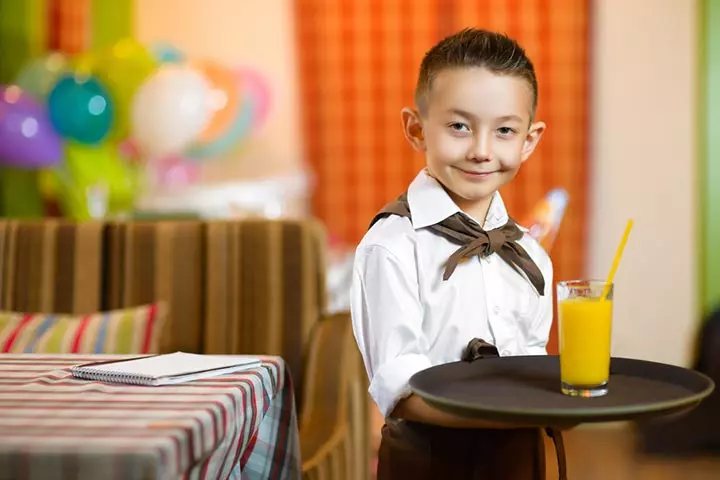
Give your child a notepad, a towel over his arm, and a uniform (even their school uniform will work). Another child or a soft toy can
Give your child a notepad, a towel over his arm, and a uniform (even their school uniform will work). Another child or a soft toy can become a cook, and an upturned cardboard box can act as a stove. Give them indestructible plates and bowls for food. You can add as many decorations as you want. This game teaches communication and teamwork and developing balance skills.
17. Bank

This game is similar to the post office game but must be played with money. Use some fake money for transactions. You can use pennies, paper clips, building blocks for coins. You can also use rectangular paper as a cheque.
Teach your child how to make deposits and withdrawals. You can also ask them to make safe lockers from cardboard boxes to store valuables.
18. Office

Children like to act like office-going parents. All you need for this is a briefcase and a table and chair. Put newspapers in your briefcase and put a few pens and pencils in it. The child leaves for work at an assigned time. They may want to dress formally for the office. You can even add a folded cardboard for children to use as a computer.
19. Circus
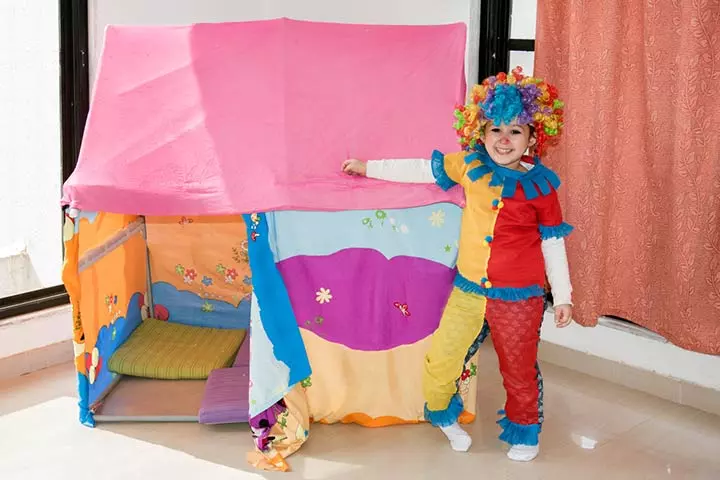
Use hula hoops and soft toys to make a fun circus at home. Let your children dress up and paint their faces. They can become clowns and ringmasters, and perform tricks on stage. Buy some popcorn from a temporary booth with a doll as a seller and enjoy the show.
20. Laundry
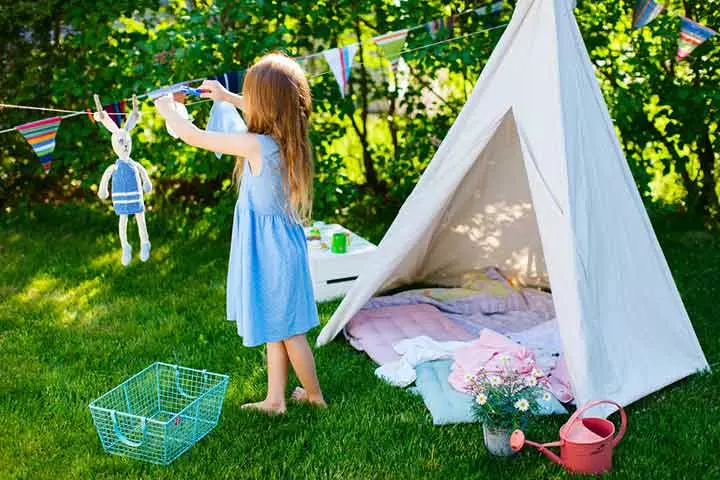
Ask your children to provide laundry services. In this role-playing game, children collect clothes from customers (stuffed toys and dolls). These clothes can be the clothes on toys or your regular clothes. Your child can pretend to wash the clothes, iron them, and send them back.
The game sounds simple but involves a lot of mental work, including listing the customer’s name and each customer’s clothes.
21. Bathe a baby
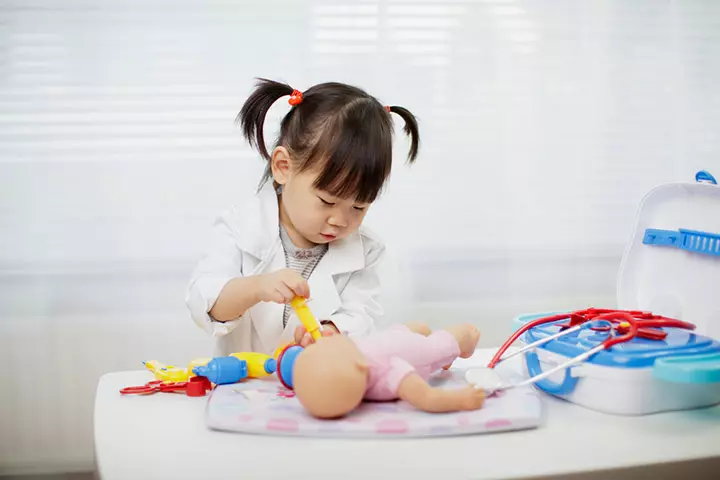
Give your child a toy baby and ask them to bathe the baby. Teach them how to hold the baby correctly, how to apply soap, giving a bath, wipe them dry, and dress the baby up. Your child can also put the baby to sleep. This game teaches your child empathy and responsibility.
22. Kids car wash tunnel
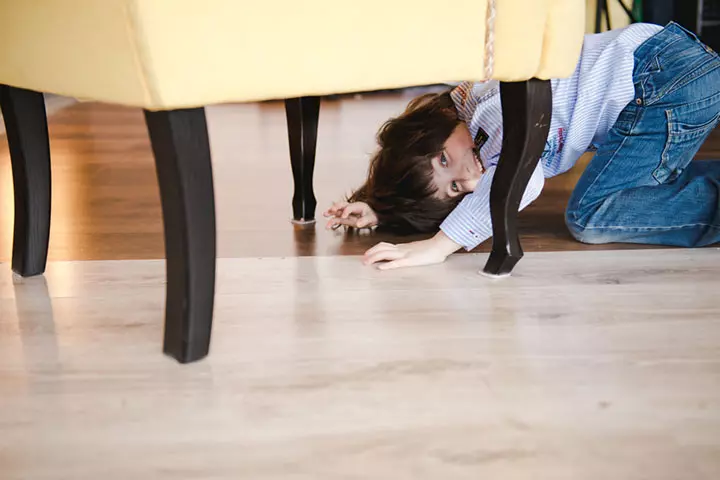
You can assemble this game with things available at home, and your children will have a lot of fun.
Throw stockings, long socks, scarves, mufflers, pants, and long-sleeved shirts on the dining chair to create a closed tunnel effect. Push two or more chairs together to make a longer tunnel. Let your child climb in from one end and come out of the other end, like cars going through a car wash. They can add sound effects to enhance the experience.
23. TV show anchor
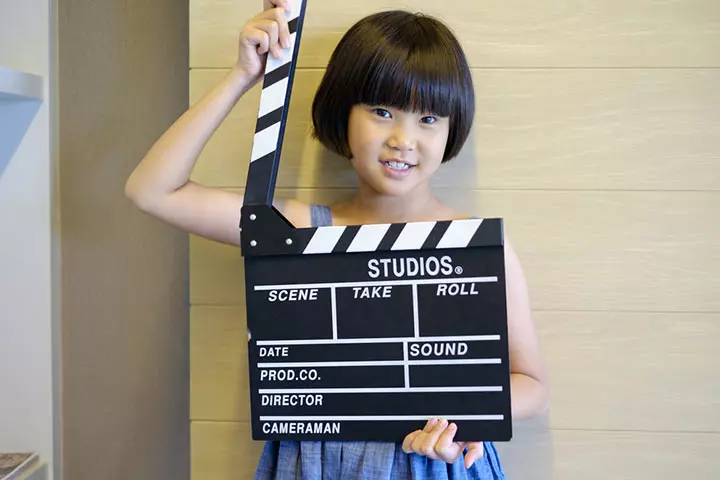
This is one of the most interesting role-playing ideas for kids. Tell your children to create their own TV show. They can decide what kind of programs they want to enact and plan out the execution. Talk shows, news broadcasts, serials – the possibilities are endless.
Cut a smaller rectangle out of the rectangular cardboard, leaving around a two-inch border around the edges. Let the children use this as a TV and role play.
24. Radio jockey
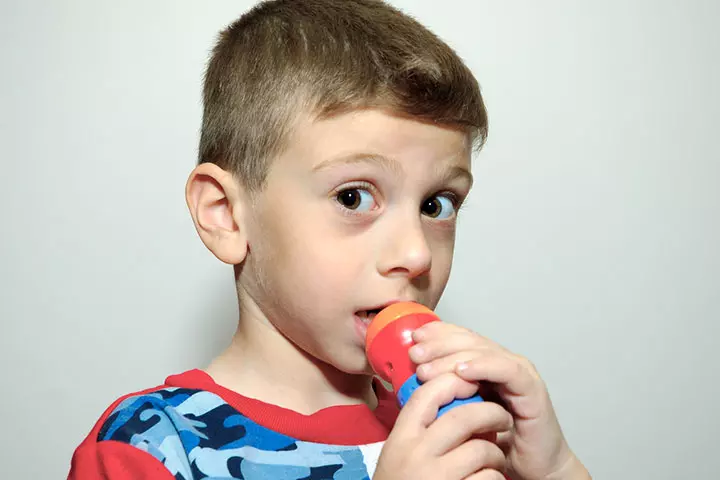
This is similar to making a TV show. Children like this activity because it gives them as many opportunities as possible to speak. You can give them a rolled-up newspaper to use as a microphone. You could also give them some devices to play music.
25. Baby caretaker
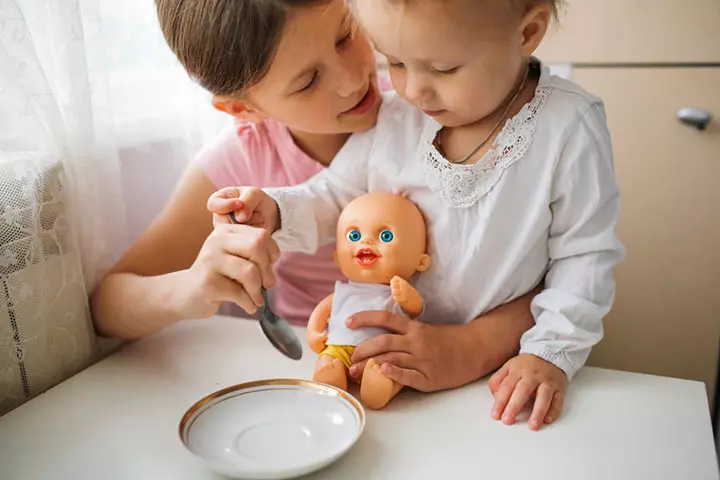
This role-playing game can be perfect if your child likes babies. Your child needs to change diapers, feed the babies, and put them to sleep. Children can use their soft toys and dolls as babies at a daycare center. This game will teach children the value of empathy and responsibility.
 Be watchful
Be watchful26. Policeman
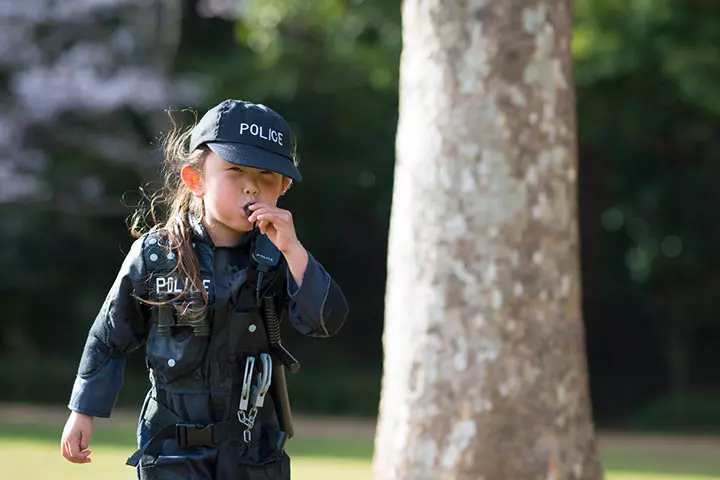
Children often play cop. This is one of the most popular role-playing game. Let your child play the role of a policeman by solving crimes, monitoring traffic. Your children can use a cardboard box as a police car and drive around the city to track down criminals.
27. Grocery store
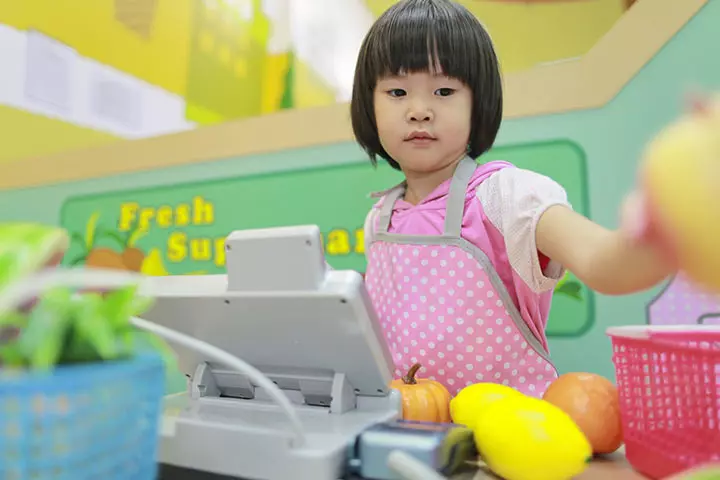
Put some random items you find at your home in various places in the play area. This is your children’s store. They must assign a price to every item. They can play various roles such as a cashier, salesperson, or customer. They must welcome customers and offer them help. Finally, the cashier pretends to calculate the total amount, and the customer must pretend to pay.
This classic game can teach children many skills, including math and communication.
28. Music band

You can get actual instruments for this game or use tableware or spoons to make musical instruments. In fact, you can use anything that makes a sound (put some rice or popcorn kernels in an empty container, pour water in cups, make paper rolls for blowing air) and allow your children to explore new sounds.
After enough practice and rehearsals, ask your children to perform in front of you as the audience.
29. Journalist
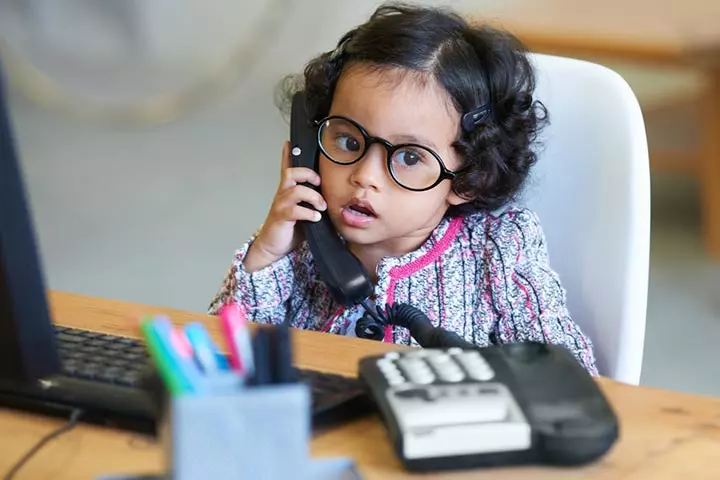
If you think your children are budding journalists, ask them to run a newspaper. They can choose their roles as an editor, writer, reporter, and photographer. They can make up imaginary stories and practice their story-telling skills or try recounting events in their life or neighborhood. They will enjoy this and provide you with the latest news.
30. Astronaut

Space is an interesting subject, and your kids can spend hours having fun learning about space and astronomy.
Help your child make a rocket out of cardstock or cardboard. Make planets and moons out of paper and hang them around the play area. Use this role-playing idea for kids to increase their knowledge of space.
They can pretend to be an astronaut by floating around in the rocket in zero gravity and exploring planets. Just like space, the possibilities of enacting the role of an astronaut are endless.
31. Family

Family role play for children involves pretending to be different family members. One can assign roles like parents, children, or grandparents. Use props such as toy kitchen sets, dolls, and pretend phones to mimic daily family activities, including cooking, going to work, or caring for a baby. This imaginative play helps children understand family dynamics and responsibilities and nurtures empathy and social skills.
Frequently Asked Questions
1. What is the difference between role play and pretend play?
Role play involves taking on the persona of a character and acting out a scenario, usually with a specific goal or purpose in mind. Pretend play for kids is an imaginative and spontaneous play where a child creates scenarios and characters. Role play tends to be more structured and goal-oriented, while pretend play is more open-ended and exploratory.
2. Why do kids enjoy role-play?
Children can discover fun things about themselves, other people, and their environment through role-play. They enjoy role-playing as it allows them to explore different emotions and situations, build social and emotional skills, develop creativity and imagination, and improve language and communication skills.
3. What are the potential risks of role-play for children?
When a child is role-playing, it is quite natural for him or her to believe stereotypes. For example, if your son shares a home with his sister and the sister acts as a mother who cooks at home while your son pretends to work in an office, this does not imply that only girls are expected to handle housework. Children must learn to appreciate all genders and to avoid stereotyping others based on their gender.
4. How does role-play help children develop self-esteem?
Children who engage in role-playing imagine themselves in circumstances that they might encounter in real life. When confronted with a real-life situation, children are self-assured to know how to manage it. Role-playing improves their self-esteem by preparing them for circumstances they may face in the future.
5. What safety precautions should I take when my child engages in role-play games?
Always supervise children during role-play games, especially when they are using props. Also, avoid using sharp toys or objects, and keep the play area free from hazards to prevent falls and injuries.
Role-playing different life scenarios test a child’s imaginative power and creativity. Through role-playing, they understand the world’s tactics, which hones their skills and prepares them for the future. Since children enjoy mimicking adults, role-play happens spontaneously. However, they may sometimes find it hard to start this imaginative play. With the above role play ideas for kids, you could introduce children to various professions of the world and their relative struggles. Since there is no limit to imagination, you can customize the play however your child likes. The only goal is to engage your child in being creative.
Infographic: Importance Of Role Play For Children
Role play can be a fun way to keep your child engaged and teach them important things simultaneously. In the following infographic, we list the points that highlight the importance of role-playing for children. Give it a read, and note the points so you can refer to them later.
Some thing wrong with infographic shortcode. please verify shortcode syntax
Illustration: Interesting Role Play Ideas For Kids And Their Benefits

Image: Dall·E/MomJunction Design Team
Let your imagination run wild! Learn creative role-play ideas for storytelling that will bring your stories to life!
References
1. Why is Play Important; Pathways
2. Julie Meighan, Role Play in Early Years Settings; Teach Preschool
3. Edward H. Cornell and C. Donald Heth, The Spatial Organization of Hiding and Recovery of Objects by Children; JSTOR
Community Experiences
Join the conversation and become a part of our nurturing community! Share your stories, experiences, and insights to connect with fellow parents.
Read full bio of Dr. Neha Bhave Salankar
Read full bio of Nisha Bharatan
Read full bio of Harshita Makvana
Read full bio of Trisha Chakraborty








